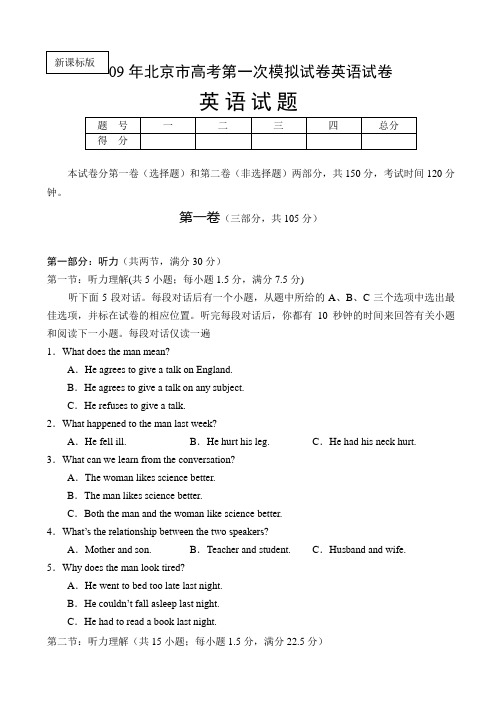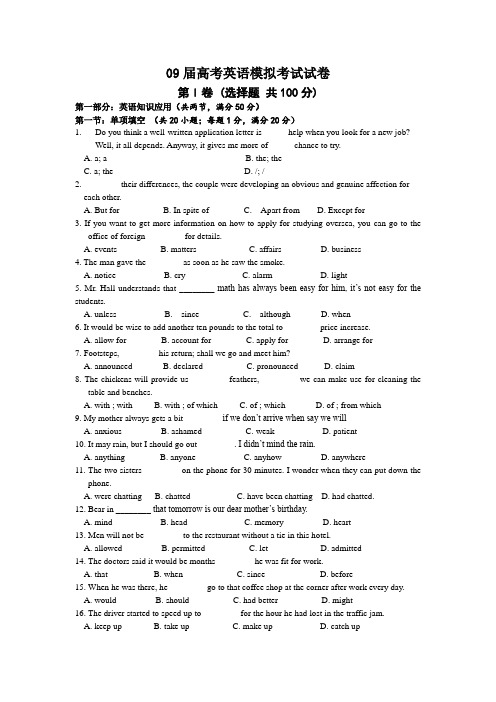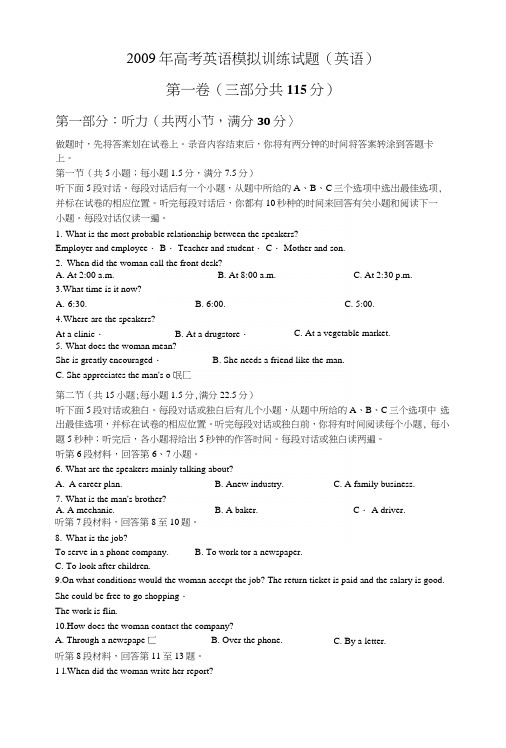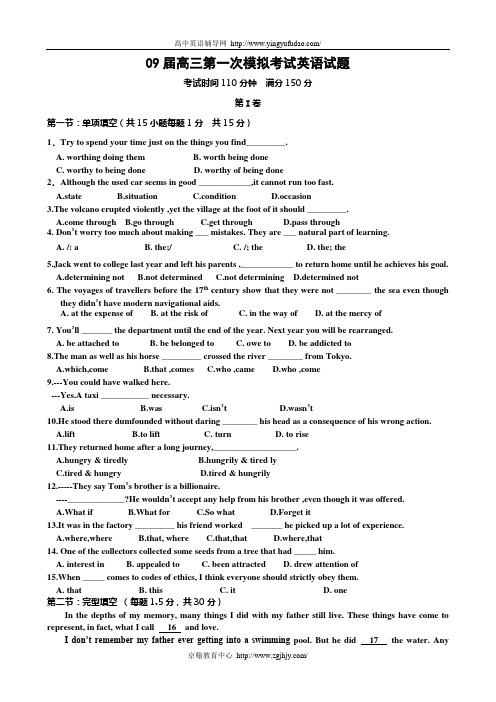09年高考第一次模拟考试英语卷
- 格式:doc
- 大小:845.50 KB
- 文档页数:14

09年北京市高考第一次模拟试卷英语试卷英语试题本试卷分第一卷(选择题)和第二卷(非选择题)两部分,共150分,考试时间120分钟。
第一卷(三部分,共105分)第一部分:听力(共两节,满分30分)第一节:听力理解(共5小题;每小题1.5分,满分7.5分)听下面5段对话。
每段对话后有一个小题,从题中所给的A 、B 、C 三个选项中选出最佳选项,并标在试卷的相应位置。
听完每段对话后,你都有10秒钟的时间来回答有关小题和阅读下一小题。
每段对话仅读一遍 1.What does the man mean? A .He agrees to give a talk on England. B .He agrees to give a talk on any subject.C .He refuses to give a talk.2.What happened to the man last week? A .He fell ill.B .He hurt his leg.C .He had his neck hurt.3.What can we learn from the conversation? A .The woman likes science better. B .The man likes science better.C .Both the man and the woman like science better. 4.What‟s the relationship between the two speakers? A .Mother and son. B .Teacher and student. C .Husband and wife.5.Why does the man look tired? A .He went to bed too late last night. B .He couldn‟t fall asleep last night. C .He had to read a book last night.新课标版第二节:听力理解(共15小题;每小题1.5分,满分22.5分)听下面5段对话或独白。

09届高考英语模拟考试试卷第I卷 (选择题共100分)第一部分:英语知识应用(共两节,满分50分)第一节:单项填空(共20小题;每题1分,满分20分)1. ----Do you think a well-written application letter is _____ help when you look for a new job?----Well, it all depends. Anyway, it gives me more of _____ chance to try.A. a; aB. the; theC. a; theD. /; /2. ________ their differences, the couple were developing an obvious and genuine affection for each other.A. But forB. In spite ofC. Apart fromD. Except for3. If you want to get more information on how to apply for studying oversea, you can go to theoffice of foreign ________ for details.A. eventsB. mattersC. affairsD. business4. The man gave the________ as soon as he saw the smoke.A. noticeB. cryC. alarmD. light5. Mr. Hall understands that ________ math has always been easy for him, it’s not easy for the students.A. unlessB. sinceC. althoughD. when6. It would be wise to add another ten pounds to the total to________ price increase.A. allow forB. account forC. apply forD. arrange for7. Footsteps, ________ his return; shall we go and meet him?A. announcedB. declaredC. pronouncedD. claim8. The chickens will provide us ________ feathers, ________ we can make use for cleaning thetable and benches.A. with ; withB. with ; of whichC. of ; whichD. of ; from which9. My mother always gets a bit ________ if we don’t arrive when say we willA. anxiousB. ashamedC. weakD. patient10. It may rain, but I should go out ________. I didn’t mind the rain.A. anythingB. anyoneC. anyhowD. anywhere11. The two sisters ________ on the phone for 30 minutes. I wonder when they can put down thephone.A. were chattingB. chattedC. have been chattingD. had chatted.12. Bear in ________ that tomorrow is our dear mother’s birthday.A. mindB. headC. memoryD. heart13. Men will not be ________ to the restaurant without a tie in this hotel.A. allowedB. permittedC. letD. admitted14. The doctors said it would be months ________ he was fit for work.A. thatB. whenC. sinceD. before15. When he was there, he ________ go to that coffee shop at the corner after work every day.A. wouldB. shouldC. had betterD. might16. The driver started to speed up to ________ for the hour he had lost in the traffic jam.A. keep upB. take upC. make upD. catch up17. Do you agree to the suggestion ________ we have a party the day after tomorrow?A. whichB. whereC. thatD. when18. Once the poison is , there is no further danger.A. brought upB. brought inC. brought backD. brought about19. ----- Excuse me, do you have the time?------___________A. Yes, I do.B. Of course, I have.C. A quarter to ten.D. No problem.20. I saw him, I know he is my former friend, Henry.A. A secondB. The secondC. For the secondD. In a second第二节:完形填空(共20小题;每小题1.5分,满分30分)阅读下面短文,掌握基大意,然后从21-40各题所给的四个选项(A、B、C和D)中,选出最佳选项,并在答题卡上将该选项标号涂黑。

2009年高考英语模拟训练试题(英语)第一卷(三部分共115分)第一部分:听力(共两小节,满分30分〉做题时,先将答案划在试卷上。
录音内容结束后,你将有两分钟的时间将答案转涂到答题卡 上。
第一节(共5小题;每小题1.5分,满分7.5分)听下面5段对话。
每段对话后有一个小题,从题中所给的A 、B 、C 三个选项中选出最佳选项, 并标在试卷的相应位置。
听完每段对话后,你都有10秒种的时间来回答有关小题和阅读下一 小题。
每段对话仅读一遍。
1. What is the most probable relationship between the speakers?Employer and employee ・ B ・ Teacher and student ・ C ・ Mother and son.2. When did the woman call the front desk?5. What does the woman mean?She is greatly encouraged ・ B. She needs a friend like the man.C. She appreciates the man's o 氓匚第二节(共15小题;每小题1.5分,满分22.5分)听下面5段对话或独白。
每段对话或独白后有儿个小题,从题中所给的A 、B 、C 三个选项中 选出最佳选项,并标在试卷的相应位置。
听完每段对话或独白前,你将有时间阅读每个小题, 每小题5秒种;听完后,各小题将给出5秒钟的作答时间。
每段对话或独白读两遍。
听第6段材料,回答第6、7小题。
6. What are the speakers mainly talking about?A. A career plan.7. What is the man's brother?听第7段材料,回答第8至10题。
8. What is the job?To serve in a phone company. C. To look after children.9.On what conditions would the woman accept the job? The return ticket is paid and the salary is good. She could be free to go shopping ・The work is flin.10.How does the woman contact the company?A. Through a newspape 匸B. Over the phone. 听第8段材料,回答第11至13题。

09届高三英语第一次模拟考试2 D5.resist A.praise B.present C.measure D.register第二节:语法和词汇知识(共15小题;每小题1分,满分15分)从A、B、C、D四个选项中,选出可以填入空白处的最佳选项。
6.—Shall I help you carry your travel case to the train, Granny?—Oh, no, my boy. It is heavy. Thank you anyway.A.so B.not much C.ratherD.not that7.You may depend on that your parents will help you.A.them B.it C.beforeD.me8.She claimed 200 dollars him injuries suffered.A.for; of B.from; of C.from; for D.for; from9.Because of his good work, John a higher class.A.was promoted into B.promoted intoC.was promoted to D.was promoting to10.—he have been chosen as captain of our school football team?—Yes, he . Can’t you see he’s wearing an armband(袖标)?A.Can; can B.Must; must have C.Must; must D.Can; must have11.The program “Super Girl!” on Hunan TV especially to young people.A.Tends B.prefers C.appeals D.devotes12.—Did you know any Chinese before you arrived in Beijing?—Never it, actually.A.had I learned B.have I learned C.I learned D.was I learning13.When the spaceship traveled above, new –looking earth appeared before us, earth that we had never seen before.A.the; the B.a; an C.an; the D.the; an14.Try to at least half an hour each day forlearning new vocabulary, and you’ll know more words.A.take up B.set aside C.put awayD.go about15., they set out to break the record for cross – channel swim.A.Well equipped B.Well equipping C.Well equips D.To be equipped16.—How beautiful the dress looks on you! Don’t you want , Madam?—Well, please show me .A.one; other B.it; other C.it; anotherD.one; the other17.I should prefer to be no discussion of my private affairs.A.it B.that C.whatD.there18.After the new technique was introduced, the factory produced trucks in 2004 as the year before.A.as twice many B.as many twice C.twice as many D.twice many as 19.Mother told me that you are here till shecomes.A.waiting B.waited C.to wait D.wait20.—Would you take this along to the office for me?—.A.With pleasure B.That’s right C.Never mind D.Don’t mention i t第三节:完形填空(共20小题;每小题1.5分,满分30分)阅读下面短文,掌握其大意,然后从各题所给的四个选项中,选出最佳选项。

2009届高三模拟考试英语试题(2009-4-26)[注] 本次2009届高三模拟考试是经过山东省教育厅批准的第一次大规模的高考模拟调研考试。
本试题很好地贯彻了2009年高考大纲精神,试题非常规范、新颖、难易适中,是很难得的好题。
第Ⅰ卷(共105分)第一部分听力(共两节,满分30分)该部分分为第一、第二两节。
注意:回答听力部分时,请先将答案标在试卷上。
听力部分结束前,你将有两分钟的时间把你的答案转涂到客观题答题卡上。
第一节(共5小题;每小题1.5分,满分7.5分)1. When will Mr. Addison return?A. On Monday afternoon.B. On Thursday night.C. On Friday morning.2. What time did the second baseball game finally start?A. At 3:45.B. At 4:45.C. At 5:45.3. Who is the man?A. Tom's boss.B. Tom's doctor.C. The woman's doctor.4. Where does this conversation take place?A. In a park.B. At a station.C. On the street.5. What can we learn from this conversation?A. The man is able to manage.B. Mr. Brown will ring back soon.C. The woman didn't answer the phone.第二节(共15小题;每题1.5分,满分22.5分)听第6段材料,回答第6至7题。
6. What is the relationship between the two speakers?A. Policeman and driver.B. Salesman and customer.C. Employer and employee.7. How much was the woman made to pay in all?A. $35.B. $50.C. $65.听第7段材料,回答第8至10题。

09届高三第一次模拟考试英语试题考试时间110分钟满分150分第I卷第一节:单项填空(共15小题每题1分共15分)1.Try to spend your time just on the things you find_________.A. worthing doing themB. worth being doneC. worthy to being doneD. worthy of being done2.Although the used car seems in good ____________,it cannot run too fast.A.stateB.situationC.conditionD.occasion3.The volcano erupted violently ,yet the village at the foot of it should _________.e throughB.go throughC.get throughD.pass through4. Don’t worry too much about making ___ mistakes. They are ___ natural part of learning.A. /: aB. the;/C. /; theD. the; the5.Jack went to college last year and left his parents ,____________ to return home until he achieves his goal.A.determining notB.not determinedC.not determiningD.determined not6. The voyages of travellers before the 17th century show that they were not ________ the sea even thoughthey didn’t have modern navigational aids.A. at the expense ofB. at the risk ofC. in the way ofD. at the mercy of7. You’ll _______ the department until the end of the year. Next year you will be rearranged.A. be attached toB. be belonged toC. owe toD. be addicted to8.The man as well as his horse _________ crossed the river ________ from Tokyo.A.which,comeB.that ,comesC.who ,cameD.who ,come9.---You could have walked here.---Yes.A taxi ___________ necessary.A.isB.wasC.isn’tD.wasn’t10.He stood there dumfounded without daring ________ his head as a consequence of his wrong action.A.liftB.to liftC. turnD. to rise11.They returned home after a long journey,___________________.A.hungry & tiredlyB.hungrily & tired lyC.tired & hungryD.tired & hungrily12.-----They say Tom’s brother is a billionaire.----_____________?He wouldn’t accept any help from his brother ,even though it was offered.A.What ifB.What forC.So whatD.Forget it13.It was in the factory _________ his friend worked _______ he picked up a lot of experience.A.where,whereB.that, whereC.that,thatD.where,that14. One of the collectors collected some seeds from a tree that had _____ him.A. interest inB. appealed toC. been attractedD. drew attention of15.When _____ comes to codes of ethics, I think everyone should strictly obey them.A. thatB. thisC. itD. one第二节:完型填空(每题1.5分,共30分)In the depths of my memory, many things I did with my father still live. These things have come to represent, in fact, what I call 16 and love.I don’t remember my father ever getting into a swimming pool. But he did 17 the water. Anykind of 18 ride seemed to give him pleasure. 19 he loved to fish; sometimes he took me along.But I never really liked being on the water, the way my father did. I liked being 20 the water, moving through it, 21 it all around me. I was not a strong 22 , or one who learned to swim early, for I had my 23 . But I loved being in the swimming pool close to my father’s office and24 those summer days with my father, who 25 come by on a break. I needed him to see what I could do. My father would stand there in his suit, the 26 person not in swimsuit.After swimming, I would go 27 his office and sit on the wooden chair in front of his big desk, where he let me 28 anything I found in his top desk drawer. Sometimes, if I was left alone at his desk 29 he worked in the lab, an assistant or a student might come in and tell me perhaps I shouldn’t be playing with his 30 . But my father always 31 and said easily, “Oh, no, it’s 32 .” Sometimes he handed me coins and told me to get 33 an ice cream…A poet once said, “We look at life once, in childhood,; the rest is34 .” And I think it is not only what we “look at once, in childhood” that determines our memories, 35 who ,in that childhood, looks at us.16.A. desire B. joy C. anger D. worry17.A. avoid B. refuse C. praise D. love18.A. boat B. bus C. train D. bike19.A. But B. Then C. And D. Still20.A. on B. off C. by D. at21.A. having B. leaving C. making D. getting22.A. swimmer B. rider C. walker D. runner23.A. hopes B. faiths C. rights D. fears24.A. spending B. saving C. wasting D. ruining25.A. should B. would C. had to D. ought to26.A. next B. only C. other D. last27.A. away from B. out of C. by D. inside28.A. put up B. break down C. play with D. work out29. A. the moment B. the first time C. while D. before30. A. fishing net B. office thingsC. wooden chairb equipment31. A. stood up B. set out C. showed up D. turned out32. A. fine B. strange C. terrible D. funny33. A. the student B. the assistant C. myself D. himself34. A. memory B. wealth C. experience D. practice35. A. as B. but C. or D. and第三节:阅读理解(共20小题;每小题2分,共40分)(A)Too often we accuse others of not listening, pretending that we ourselves are faultless, yet in our hearts we know that many of the mistakes we make come about because we haven’t listened carefully enough. We get things wrong because we haven’t listened carefully enough. We get things wrong because we haven’t quite understood what someone meant when they were talking to us. Anyone who has ever taken the minutes of a long meeting will know how hard it is to remember-- despite the benefit of notes-- exactly what everyone said. But success depends on getting things right--and that means listening.Listening is not the same thing as hearing; it is not an effort actively. It demands attention and concentration. It may mean quizzing the speaker for additional information or for clarification------ it isalways better to ask than to continue regardless and get things wrong. However, if you allow your mind to wander onto something else, even for a few minutes, you’ll miss what the speak er is saying------ probably at the very moment when he or she is saying something critical. And not having heard, you won’t know you’ve missed anything until it’s too late.The most common bad habit we have is to start thinking of what we are going to say about the subject long before the other speaker has finished. We then stop listening. Even worse, this often adds rudeness to inattentiveness, as once you have decided what to say there is a fair chance you will interrupt to say it. Good listeners don’t in terrupt. In fact it is often worth explaining the main idea of what you have just been told before going on to make your own points. Nobody is offended by this and it shows that you have listened well.Above all be patient and accept that many people are n ot very good communicators. It’s helpful to remember that the ways people move and position themselves while they are speaking can reveal a great deal about what they are saying. Equally important you should put yourself in the other person’s place, both intellectually and emotionally; it will help you to understand what they are getting at and form a response. But don’t be too clever. Faced with a know-all, many people keep quiet because they see no point in continuing.36. Which is the best title for this passage?A. Don’t be too cleverB. Be a good listener.C. Don’t miss anything criticalD. Think of the speaker37. In the last paragraph, “…… what they are getting at ……” means________ .A. what they implyB. what they likeC. what they attackD. what they achieve38. What is the writer’s opinion?A. If you want to be a good listener, you should be very clever and emotional.B. Speakers won’t continue talking when their listeners explain what they’ve heard.C. If you don’t want to get things wrong, it’s important to be a good listener,D. It’s hard to be a good listener because listening tests you on your intelligence.39. What is the lesson we can learn from this passage?A. Don’t accuse others of not listening while talking with them.B. Don’t get anything wrong if you miss what the speaker is saying.C. Listening inattentively may cost you the loss of your success.D. Think carefully of what you’re going to say before the speaker finishes.(B)My father was a foreman of a sugar-cane plantation in Rio Piedras, Puerto Rico. My first job was to drive the oxen that ploughed the cane fields. I would walk behind an ox, guiding him with a broomstick. For $ 1 a day, I worked eight hours straight, with no food breaks.It was very tedious work, but it prepared me for life and taught me many lasting lessons. Because the plantation owners were always watching us, I had to be on time every day and work as hard as I could. I’ve never been late for any job since. I also learned about being respectful and faithful to the people you work for. More important, I earned my pay; it never entered my mind to say I was sick just because I didn’twant to work.I was only six years old, but I was doing a man’s job. Our family needed every dollar we could make because my father never earned more than $ 18 a week. Our home was a three-room wood shack with a dirty floor and no toilet. Nothing made me prouder than bringing home money to help my mother, father, two brothers and three sisters. This gave me self-esteem(自尊心), one of the most important things a person can have.When I was seven, I got work at a golf course near our house. My job was to stand down the fairway and spot the balls as they landed, so the golfers could find them. Losing a ball meant you were fired, so I never missed one. Some nights I would lie in bed and dreamt of making thousands of dollars by playing golf and being able to buy a bicycle.The more I dreamed, the more I thought. Why not? I made my first golf club out of guava limb(番石榴树枝) and a piece of pipe. Then I hammered an empty tin can into the shape of a ball. And finally I dug two small holes in the ground and hit the ball back and forth. I practiced with the same devotion and intensity. I learned working in the field — except now I was driving golf balls with club, not oxen with a broomstick.40. The writer’s first job was _______.A. to stand down the fairway at a golf courseB. to watch over the sugar-cane plantationC. to drive the oxen that ploughed the cane fieldsD. to spot the balls as they landed so the golfers could find them41. The writer learned that_______ from his first job.A. he should work for those who he liked mostB. he should work longer than what he was expectedC. he should never fail to say hello to his ownerD. he should be respectful and faithful to the people he worked for42. _______ gave the writer self-esteem.A. Having a family of eight peopleB. Owning his own golf courseC. Bringing money back home to help the familyD. Helping his father with the work on the plantation43. Which of the following statements is true according to the passage?A. He wanted to be a successful golfer.B. He wanted to run a golf course near his house.C. He was satisfied with the job he got on a plantation.D. He wanted to make money by guiding oxen with a broomstick.(C)Western New Bridge Library Announcement2008-3-10A. buy a ticketB. apply in advanceC. make a reservationD. contact the call-down service45. According to the passage, Enzo Monfre will ______.A. show the children around a zooB. tell stories to children over sevenC. be present at the science show in personD. lead the children to the Ellen DeGenerse Show46. The Help Desk in this library supplies service ______.A. only during the daytimeB. in case of emergencyC. till the end of the Spring BreakD. after 22:00 p.m. every day47. We can learn from the passage that children can ______.A. attend all the activities with their parentsB. borrow some relevant books for the activities.C. participate in the activities form 8:00 a.m. to 4:00 p.m.D. choose only one of the activities according to their interstDIntellectual property (IP) is a product of the mind that has commercial value. The concept dates back to 1623 when the first patent law to protect IP rights was passed. IP rights protect an artist from having his/her creative ideas copied by another. For example, if somebody generates an idea for a novel, that idea is protected by IP rights. If someone else wishes to represent the idea or develop it further, he/ she must consult the original artists, who will normally be rewarded financially for its use. Back in the 17th century,IP rights were primarily carried out to protect newly developed manufacturing processes against stealing. But today, intellectual property rights, are also enjoyed by those who create music, art and literature.In recent years, IP rights have been the focus of a great deal of discussion because of a technology which seems to weaken them altogether; the Internet. Many years ago, if you wanted a recording of a song, you would have to purchase it from a music store; if a novel, from a book store. In those days, IP rights were easily protected since it was very difficult to obtain intellectual property without paying for it. However, a lot of IP, including songs, films, books and artwork, can be downloaded today free of charge using the Internet. This practice has now taken the world by storm, dramatically affecting the way in which we view IP rights.48 According to the writer, in the beginning, IP rights were mainly of use to ______.A. those creating music, art and literatureB. novelistsC. engineers and inventorsD. those not receiving financial reward for their work49. What do we know about the internet according to the passage?A. It makes IP rights harder to protect.B. It sells songs and films.C. It does not affect the way we understand IP rights.D. It prevents the production of artwork.50. According to paragraph 2, what has “taken the world by storm”?A. Intellectual property rights.B. The Internet.C. Free downloading.D. The large number of songs, films and books.第Ⅱ卷第一节:阅读理解(共5小题;每小题2分,满分10分)请将答案写在第Ⅱ卷的指定位置。
09届高考英语第一次模拟试卷第一部分:听力(共20小题;每小题1分,满分20分)第一节(共5小题;每小题1分,满分5分)听下面5段对话。
每段对话后有一个小题,从题中所给的A,B,C三个选项中选出最佳选项,并标在试卷的相应位置。
听完每段对话后,你都有10秒钟的时间来回答有关小题和阅读下一小题目。
每段对话仅读一遍。
1.When will the train arrive?A.At 4 p.m.B.At 5:30 p.m.C.At 4:30 p.m.2.Why does the woman like English?A.It is very interesting.B.It is useful.C.It is easy to learn.3.What has the man done?A.Something good.B.Something bad.C.Nothing at all.4.What was the main reason why Mr Smith knocked down the boy?A.The boy ran too fast.B.He was drunk.C.His car was out of control.5.When must Nancy hand in her composition?A.By 10:00 a.m.B.By tomorrow.C.By twelve o’clock.第二节(共15小题;每小题1分,满分15分)听下面5段对话或独白。
每段对话或独白后有几个小题,从题中所给的A,B,C三个选项中选出最佳选项,并标在试卷的相应位置。
听每段对话或独白前,你将有时间阅读各个小题, 每小题5秒钟; 听完后,各个小题将给出5秒钟的作答时间。
每段对话或独白读两遍。
听第6段材料,回答第6至8题。
6.What will there be after class?A.A game.B.A meeting.C.A film.7.Who are the class going to help?A.Mike.B.Alice.C.Tom.8.Why ca n’t Alice come?A.She has to visit Tom.B.She has to do her homework.C.She has to look after her mother at home.听第7段材料,回答第9至11题。
试卷类型:A广东省茂名市2009年第一次高考模拟考试英语本试卷共10页,四大题,满分150分。
考试用时120分钟。
注意事项:1. 答卷前,考生务必用黑色字迹的钢笔或签字笔将自己的姓名和考生号、试室号、座位号填写在答题卡上。
用2B铅笔将试卷类型(B)填涂在答题卡相应位置上。
将条形码横贴在答题卡右上角“条形码粘贴处”。
2. 选择题每小题选出答案后,用2B铅笔把答题卡上对应题目选项的答案信息点涂黑,如需改动,用橡皮擦干净后,再选涂其他答案,答案不能答在试卷上。
3. 非选择题必须用黑色字迹钢笔或签字笔作答,答案必须写在答题卡各题目指定区域内相应位置上;如需改动,先划掉原来的答案,然后再写上新的答案;不准使用铅笔和涂改液。
不按以上要求作答的答案无效。
4. 考生必须保持答题卡的整洁。
考试结束后,将试卷和答题卡一并交回。
I 听力(共两节。
满分35分)第一节听力理解 (5段共15小题;每小题2分,满分30分)每段播放两遍。
各段后有几个小题,各段播放前每小题有5秒钟的阅题时间。
请根据各段播放内容及其相关小题,在5秒钟内从题中所给的A、B、C项中,选出最佳选项,并在答题卡上将该项涂黑。
听第一段对话,回答第1~3题。
1. What is the normal length of time a reader can keep the books?A. Two weeks.B. Three weeks.C. Five weeks.2. How long can the man keep the books?A. Three weeks.B. Five weeks.C. Six weeks.3. How will the man most probably pay for the library services?A. In cash.B. By credit card.C. By sending a check.听第二段对话,回答第4~6题。
09年高中毕业班英语第一次高考模拟考试英语2008.9满分:150分时间120分钟注意事项:1. 答卷前,考生务必用黑色字迹的钢笔或签字笔将自己姓名和考生号填写在答题卷上。
用2B铅笔将答题卡试卷类型(B)涂黑。
不按要求填涂的,答卷无效。
2. 选择题每小题选出答案后,用2B铅笔把答题卷上对应题目的答案标号涂黑,如需改动,用橡皮擦干净后,再选涂其它答案,答案不能答在试卷上。
3. 非选择题必须用黑色字迹钢笔或签字笔作答,答案必须写在答题卷各题目指定区域内相应位置上,如需改动,先划掉原来的答案,然后再写上新的答案;不准使用铅笔和涂改液,不按以上要求作答的答案无效。
4. 考生必须保持答题卷的整洁,考试结束后,将答题卷交回。
Ⅰ. 听力(共两节,满分35分)第一节:听对话或独白(共15题;每小题2分,满分30 分)听下面5段对话或独白。
每段对话或独白后有几个小题,从题中所给的A、B、C 三个选项中选出最佳选项,并标在试卷的相应位置。
听每段对话或独白前,你将有时间阅读各个小题,每小题5秒钟;听完后,各小题将给出5秒钟的作答时间。
每段对话或独白读两遍。
听第一段对话,回答第1-3小题。
1.Why can’t Karen concentrate on the book?A. She’s worried about the lecture.B. She finds it too hard.C. She lacks interest in it.2. Why is Karen starting to like the course less and less?A. The lectures are boring.B. She prefers music to English.C. The course is poorly designed.3.What is Karen thinking of doing?A. Changing the university.B. Spending less of her parents’ money.C. Giving up the course.听第二段对话,回答第4-6小题:4. On what condition does the man decide to buy the watch?A. He finds out the price low enough.B. He is given an oral promise.C. He is given a written promise.5. Why does the man’s watch go wrong?A. He forgot to wind it.B. He dropped it once.C. It goes wrong on its own.6. When and how will the man get his old watch?A. It’ll be mailed to him next Saturday.B. The woman will deliver it to the man next Saturday.C. He will come to get it himself next Saturday.听第三段对话,回答第7-9小题:7. How is the woman planning to collect money?A. By getting donations.B. By putting ads.C. By doing part-time jobs.8. How will the people be paid?A. They work for no money.B. They will be paid by the day.C. They will get very limited pay.9. What do we know about the programs?A. The programs haven’t been decided yet.B. There are already good programs.C. They don’t have to decide the programs.听第四段独白,回答第10-12小题:10. What’s the most serious eating problem of women?A. Eating too much and being too fat.B. Eating too little and being too weak.C. Eating no meat and being too thin.11. What’s the reason for the eating problem?A. Many women can’t get enough food.B. The society fails to provide enough food.C. The society demands women to be thin.12. What’s the speaker’s opinion?A. Women should eat as much as they can.B. Women should first of all be healthy.C. It’s meaningful for women to be beautiful.听第五段对话,回答第13-15小题:13. What’s the man doing when the woman calls him?A. Reading a poem.B. Writing a book.C. Reading a novel.14. Why doesn’t the woman like reading novels?A. Because it takes too much time.B. Because it requires less attention.C. Because novels don’t tell deep meanings.15. What does the man like least?A. Novels.B. Poems.C. Short stories.第二节:听取信息(共5小题;每小题1分,满分5分)听下面一段独白,请根据题目要求,从听到的内容中获取必要的信息,填入答题卷上标号为16-20的空格中。
09届高考英语第一次模拟测试英语I听力(共两节,满分35分)第一节听力理解 (共15小题;每小题2分,满分30分)每段播放两遍。
各段后有几个小题,各段播放前每小题有5秒钟的阅题时间。
请根据各段播放内容及其相关小题,在5秒钟内从题中所给的A、B、C项中,选出最佳选项,并在答题卡上将该项涂黑。
听第1段对话,回答第1~3题。
1. What does the woman advise the man to do?A. Watch a TV play.B. Go to the cinema.C. Listen to a radio play.2. Why doesn’t the man buy a new radio?A. Because he doesn’t have enough money at present.B. Because he thinks the old one is as good.C. Because he doesn’t like a new one.3. What does the man think of the radio programme?A. It’s hard to understand.B. It’s interesting.C. It’s boring.听第2段对话,回答第4~6题。
4. What does the man want to do?A. Buy a package.B. Visit Union Express.C. Send something back home.5. Where will the package be picked up from?A. From the Company “Union Express”.B. From University of Glasgow.C. From the post office.6. What’s the man’s response to the charge?A. He accepts it.B. He has to think about it.C. He thinks it’s too expensive.听第3段对话,回答第7~9题。
09年高考第一次模拟考试英语卷英语试题(无听力)本试卷分为第一卷(选择题)和第二卷(非选择题)两部分.满分150分,考试时间120分钟。
第Ⅰ卷(满分95分)第一部分英语知识运用(共三节,满分50分)第一节语音知识(共5小题;每小题1分,满分5分)从A、B、C、D四个选项中,找出其划线部分与所给单词的划线部分读音相同的选项。
1.water A.cough B.parent C.volleyball D.war 2.scream A.pleasure B.straight C.really D.magazine 3.Variety A.spear B.island C.unfair D.require 4.Square A.won B.answer C.one D.sugar 5.Course A.usual B.cause C.houses D.increase 第二节语法和词汇知识(共15小题;每小题1分,满分15分)从A、B、C、D四个选项中,选出可以填入空白处的最佳选项,并在答题卡上将该项涂黑。
例:It is generally considered unwise to give a child he or she wants.A.however B.whatever C.whichever D.whenever答案是B.6.Things of_____kind come together and people of____mind fall into the same group.A.不填, 不填B.the,不填C.a, a D.不填,a7.Is there a bookshop around I can buy an English-Chinese dictionary?A.which B what.C.that D.where8.______wants to study well must learn things_______.A.No matter who, with heart B.who, with his heartC.Whoever, by heart D.Whoever, by his heart9.—You can’t stand working with Jane in the same office, can you?—______,because she just refuses _______while working.A.No, to stop talking B.Yes ,to stop talkingC.No, stopping to talk D.Yes, stopping talking10.Mr. Li, our new manager, has gone abroad.Otherwise he_______our work right now.A.is inspecting B.will inspectC.would be inspecting D.would have inspected11.—Your sister’s birthday is on the way.What do you expect I have got for her?—I expect you’ll give her a new English-Chinese dictionary of idioms,but it is being printed and will soon_________.A.turn out B.come out C.start out D.go out12.If all the oil in the world has_______,what shall we use?A.run out of B.run out C.put out D.used up13.—I’m sure my elder sister ________weight recently.—I can’t agree more.she_____too much.A.has gained, is eating B.lost, doesn’t eatC.is gaining, is eating D.is gaining, eats14.Early European cards are said______for entertainment and education.A.to be invented B.to have inventedC.to have been invented D.and invented15.—The terrible flood brought about $ 10 million in losses to the island country.—________.A.Quite OK B.Certainly C.That’s the case D.I agree 16.Everyone was on time for the meeting _____besides Jack, who’s usually ten minutes late for everything.A.but B.only C.even D.yet17.—Only 10 minutes has passed.Jack _________home.—Yes.Otherwise, he _________ us.A.shouldn’t have arrived; would have phonedB.oughtn’t to arrive; would have phonedC.must have arrived; would phoneD.shouldn’t have arrived; would phone18.In this university a medal with ten thousand dollars ________gains success in science and technology every two years.A.is given to whoever B.are given to anyone whoC.gives to whomever D.give to everyone19.Although he sometimes loses his temper, his students like him ________ for it.A.not so much B.not so little C.no more D.no less20.Now that he has missed his ________, he’ll have to wait for the next round.A.turn B.chance C.duty D.class第三节完形填空(共20小题;每小题1.5分,满分30分)阅读下面短文,撑握其大意,然后从36—55各题所给的四个选项(A.B.C和D)中,选出最佳选项Having reached the highest point of our route according to our plan, we discovered something the map had not told us.It was 21 to climb down into the Kingo valley.The river lay deep 22 mountain sides that were almost vertical(垂直).W e couldn’t find any animal tracks, which usually 23 the best way across country, and 24 thickly were the slopes covered with bushes that we could not see the nature of the ground.Our guide did 25 but cut a narrow path through the bushes with his long knife and we 26 him in single file.Progress was slow.Then, we 27 we had really reached the river, only to find ourselves on the edge of a cliff(悬崖)with a straight drop of 1,000 feet to the water 28 .We 29 up the slope(斜坡)and began to look for another way down.We climbed and finally arrived at the river.30 we came downhill along its bank 31 having to cut our way.However, after a few miles the river 32 a steep-sided gap between rocks and suddenly dropped thirty-five feet over a waterfall.No path alongside it and no way round it.Then one of the guides 33 a way of overcoming the difficulty.There was a 34 tree lying upside down over the waterfall with its leafy top resting on the opposite 35 below the falls.Without 36 he climbed down the slippery trunk to show us how 37 it was.Having got to the fork of the tree, he 38 hand over hand along a branch for four or five feet with his legs 39 in space, then he dropped onto the flat bank the other side, throwing his 40 in the air like a footballer who has scored goal, and cheerfully waving us on.21.A.possible B.certain C.impossible D.unnecessary 22.A.between B.among C.near D.beside23.A.say B.show C.speak D.read24.A.very B.almost C.too D.so 25.A.something B.everything C.nothing D.anything 26.A.watched B.followed C.noticed D.saw 27.A.imagined B.thought C.discovered D.suggested 28.A.below B.under C.above D.over 29.A.walked back B.looked back C.climbed back D.looked behind 30.A.Unluckily B.Happily C.Sadly D.Surprisedly 31.A.without B.with C.for D.within 32.A.became B.fall into C.fled D.entered 33.A.searched B.thought of C.cut D.saw34.A.tall B.short C.fallen D.falling 35.A.bank B.way C.river D.road 36.A.measure B.exception C.comparison D.hesitation 37.A.difficult B.amusing C.easy D.hopeless 38.A.gave B.lent C.moved D.walked 39.A.hanging B.sticking C.fastened D.tied40.A.head B.legs C.body D.arms第二部分阅读理解(共25小题。